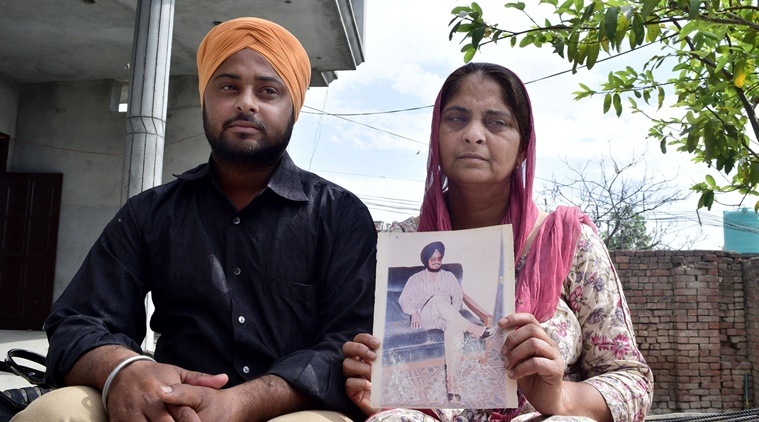 Balwinder Kaur with his son.
Balwinder Kaur with his son.
The debate over encounter killing of gangster Vikas Dubey in Uttar Pradesh has reopened the wounds of the families of 11 Sikh men who were killed in 1991 in state’s Pilibhit in three fake encounters.
The families waged a 25-year-long legal battle before a court held 47 UP Police personnel guilty in the case.
Dubey was shot dead Friday by police, who claim he was trying to flee after the car carrying him from Ujjain, Madhya Pradesh, overturned on an isolated stretch of the highway on the outskirts of the Kanpur.
The gangster, who had been on the run after killing eight policemen, was arrested a day earlier.
“Today, everybody is discussing if the encounter killing of Vikas Dubey was fake or real. There is also a debate if encounter is justified or not. But everybody seemed to have believed the Uttar Pradesh Police when it termed our family members as criminals and killed them in 1991. For 25 years, we remained families of terrorists for society and media till 20176 when a CBI court declared that the killings were done in fake encounters. That episode (1991) didn’t defame UP Police as fake encounter experts. In fact, no one even noticed it then,” said Balwinder Kaur, who lost his husband and brother-in-law in the fake encounters and had led the legal fight for other victim families.
In April 2016, a special CBI court had held 47 policemen guilty of killing 11 Sikh men in three fake encounters in a single night in Pilibhit in July 1991.
The victims along with their family members were on a pilgrimage and travelling in a bus, which had obtained temporary permit from the regional transport office in Bareilly.
Most of the 11 victims were from Gurdaspur in Punjab. The CBI had investigated the case on the directions of Supreme Court.
The court had sentenced 47 policemen to life imprisonment. It had also directed to give Rs 14 lakh each to the victim’s family from the fines collected from the convicts.
Currently, 12 of the accused are out on bail on the ground of age.
“UP police had destroyed almost all the evidence. It was CBI that found contradictions in police theory. So I won’t be surprised if no evidence is found to support the allegations that Dubey was killed in fake encounter. I have no sympathy for Dubey. But it is also true that there are more chances of an innocent becoming a victim of encounter culture than a gangster like Dubey. I don;t have any reasons to support any encounter,” said Balwinder Kaur.
Three years after the court verdict, the families of the victims are still waiting for the compensation.
“Lower court had ordered the accused to pay compensation to victim families. Each accused had to pay compensation from Rs 8 lakh to Rs 15 lakh according to their ranks. Then all this money had to be distributed among the victim families. However, this compensation can’t be given to victim families until the appeal is decided in high court. Wait could be longer as the case can also move to Supreme Court after being decided by the high court,” said Vivek Kumar Rai, lawyer for the victim families in High Court.
Eight of the 11 victims belong to six families from villages that fall within 20 km radius in Gurdaspur district. Three of the victims were from Uttar Pradesh.
All families share a common background — all are Jat Sikhs with very small land holdings.
Apart from the pain of loss of their near and dear ones in the fake encounters in Uttar Pradesh, all families were also allegedly harassed by Punjab Police over alleged recovery of weapons.
Some of them allegedly faced physical and mental torture. They had approached Punjab government for help but in vain.
“Fake encounters of our family members tagged us as terrorists. Punjab Police harassed us in or own state after the encounter killings. We were asked to produce weapons that were supposed to have been used in terror activities. It took 25 years to prove that we were not terrorists,” said Balwinder Kaur.